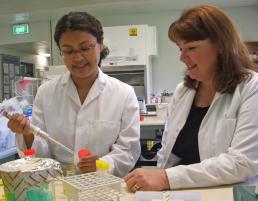Flu grips State but help is on the way
Published on 23 August, 2007

Researcher Jeanette Villanueva and Professor Jennelle Kyd from the Capricornia Centre for Mucosal Immunology conduct research in CQU laboratories that aims to prevent bacteria infections that cause middle ear and lung infections.Queensland has been gripped by one of the worst flu seasons in years, leaving many patients with secondary bacterial infections.
Despite the Australian Medical Association urging people to be vaccinated against the flu every year, many don't take heed. And if luck doesn't prevail and an infection develops antibiotics become the treatment of choice.
However, behind the scenes a number of Queensland researchers are developing alternative precautions that one day may see a preventative immunisation or better still a non-invasive protection against a range of respiratory bacterial infections.
Central Queensland University's Pro Vice-Chancellor (Research and Innovation) Professor Jennelle Kyd is leading a team of researchers in Rockhampton, in Central Queensland, and collaborating with many across Australia, Europe and the USA including pharmaceutical companies on the research and development of patents to the clinical trials stage for a range of new therapies.
"We currently treat respiratory infections with antibiotics, but we need to find better preventative therapies otherwise we'll continue to increase the emergence of bacteria that are drug resistant. Vaccines offer the best strategy for long term prevention of infections," Professor Kyd explained.
Middle ear infection is one of the most common conditions in children with over 70% suffering in the first few years of life.
The same bacteria are responsible for many respiratory conditions, but also exist as part of the normal nasal bacterial flora.
Professor Kyd said while the new paediatric pneumococcal vaccine targets some of the problem bacteria, there is a gap in vaccine coverage, meaning that children still become infected by the other bacteria that cause the same type of infection.
"The current vaccines and some more recent clinical trials with a newer formulation have demonstrated that it is possible to reduce the number of infections caused by some of these bacteria and adding other components could make a much greater impact on reducing respiratory and middle ear bacterial infections."
The Capricornia Centre of Mucosal Immunology, under the leadership of Professor Kyd, is developing new vaccines and non-injection type delivery for bacterial infection protection.
Australian Indigenous children have one of the highest incidence rates in the world, with many becoming chronic sufferers resulting in persistent effusions, ruptured ear drums and hearing loss at a crucial stage in their development.
"We are also trying to identify why Indigenous kids are even more prone to middle ear infections. A controlled study has shown that socio-economic reasons do not fully explain this propensity, and many of our indigenous children succumb to middle ear infections at an earlier age and go on to suffer serious recurrent or chronic middle ear infections," Professor Kyd said.

